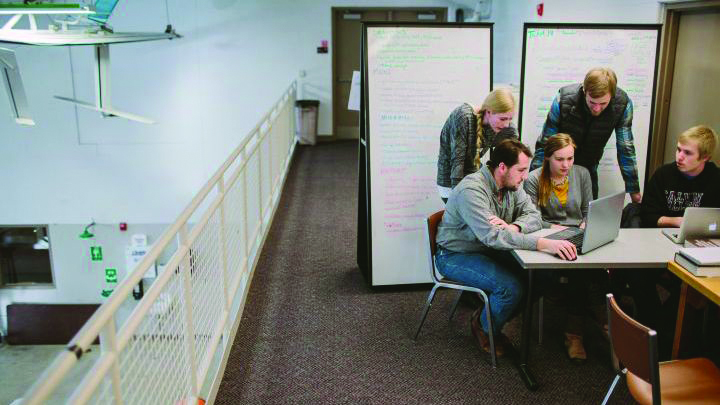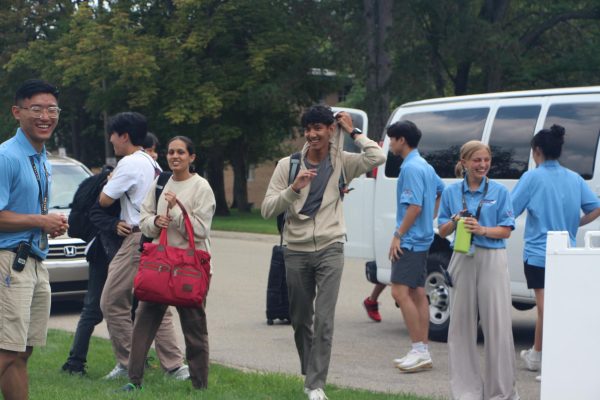Students share their stories as women in engineering
It has been noted many times over that women are the minority in the world of tech. This is known and talked about often. Despite it being a well-known fact, the problem doesn’t seem to be improving, or even changing at all.
An article by Liza Mundy, “Why is Silicon Valley So Awful to Women?” explores the negative experiences that many women have in the tech field. She narrates the encounters that one woman, Bethanye Blount, had to deal with:
“Over the years, she’s experienced — many times — the sensation of walking up to a group of male colleagues and noticing that they fell quiet, as though they’d been talking about something they didn’t want her to hear. She’s been asked to take notes in meetings. She’s found herself standing in elevators at tech conferences late at night when a guy would decide to get, as she puts it, handsy.”
That is not even the end of the issue. Mundy goes on to talk about how women in engineering feel suppressed by the men in the field. While this is not always the case, it comes up enough that many think it still hasn’t been adequately addressed. Similarly, “Why Women Leave Engineering: The SWE Gender Culture Study,” an article by Meredith Holmes published by the Society of Women Engineers (SWE), looks into the reasons and motivators that women have when they leave their careers in engineering. Holmes’ conclusion:
“Women leave the profession after working in environments that tolerate persistent obstacles to attaining their company and career goals.”
This is the large scale view of the problem. Women are still fighting for a change to this problem, and they are doing so as they work in their careers. They have made it to where they want to be, and now they find themselves struggling to stay there. The struggle exists in other areas as well however. For the women who aim to join the career, the fight looks very different while they study to become engineers.
At Calvin, the number of female engineering students is in the minority, and oftentimes, many may have or continue to wrestle with insecurities regarding their chosen field of study. When asked about the responses they have gotten to being in the engineering field, some of the women have not been met with the most uplifting of attitudes.
Junior Rachel Evans shares the general tone of the responses she receives when she says that she is an engineering major:
“When I tell people that I am studying engineering, the responses vary based on gender and age. Usually, peers are very supportive of studying engineering, but older generations are still holding onto the stereotypes. When I have told older men that I am studying engineering, they are very supportive and tell me to work hard for it. For older women, they are usually shocked and the conversation quickly goes toward me being in a male dominated field, whether or not I can handle it and how I should end up marrying one of them.”
In a classroom setting, the female engineers may be reserved, not actively participating or asking very few questions. Being confronted by a room full of guys can be intimidating to women. Junior Janelle Bellamy noted:
“The guys seem intimidating and cocky in one of my classes. I feel like I have to get every answer correct if I speak up because I have to uphold my reputation of being really smart because I’m a female engineering major.”
Evans also chimed in on why she thinks some women in engineering don’t speak up in class:
“I think the reason other women don’t speak up in class is because they don’t know the other people in class. I would say that I know most people in my classes, so I’m not afraid to ask the questions. My suggestion is to get to know people in the classes, then it won’t seem as scary.”
Even in a personal setting, such as group study, women may be afraid to speak up because they expect to be answered with “mansplaining.” Junior Sarah Cok shares her experience on this happening to her as an underclass students:
“I don’t feel this way now, but in the beginning it was often the case that I would explain or ask about something, and a guy would repeat what I just said as if it wasn’t intelligible when I said it.”
There is also the usual concern for women who plan to become mothers someday. Women in engineering are in a position where they cannot easily become stay-at-home-moms, but many won’t let that stop them from becoming what they want to be. Evans comments on her own situation in this area:
“Women in engineering are in a tough spot when they have children. Other women in other fields can easily become a stay-at-home mom. If an engineer takes five or so years off, it can be hard to come back. I have been pressured by my mother to become a stay-at-home mom because day care would ‘ruin my children.’”
Similarly, Junior Caitlin Schutt explains that she would like to get married and have a family but not until she has started her own career. Schutt continues, “I don’t plan on being a stay-at-home mom.” Schutt is not the only one who feels this way. In the changing world it is possible to have a full time job while maintaining a healthy family life.
“I’m hoping to get married and have children in addition to working in an office,” says senior Anna Little. “This is just how I feel personally and shouldn’t be forced on anyone.”
Many women students in the engineering department are willing to give advice as to how women could be made to feel more welcome in the field. Schutt advises engineering students to “encourage girls to pursue a science education and not to mock them if they struggle or fail.”
Giving encouragement and being supportive is important. Some suggestions regard simply taking an interest in fellow female engineers as a person (this can be as simple as asking about how they are doing and paying attention to their answer), engaging in conversation with them in such a way that they feel included or inviting these ladies to join homework and study groups are all positive actions.
Little encourages everyone to “be respectful of all contributions equally and of women in general. That will go a long way.” She also has this to say to women who are considering engineering as their field of study:
“If this is the right fit for you, you will find a groove and people in your classes that will challenge you and make you feel competent. It is possible and it feels really great to accomplish so much in this program! It’s not easy, but it’s not easy for anyone. We’re all in this together.”
Sophomore Lillie Spackman also has some advice for prospective students:
“It’s an awesome option. But don’t do it to be the token women, just as much as you should not leave just because you’re one of few women. If you’re serious about it and you know you need support, don’t hesitate to advocate for yourself and those around you.”
“Just be aware,” says Evans. “Be aware of the women in classes and support them. One good way to do that would be to go to the Society of Women Engineering club meetings. SWE exists to support women, and guys can help with it. They hold events that are great for professional development, so all can benefit. And for guys, being in SWE looks great on your resume! It shows that you are aware of the lack of diversity and are there to help support women.”









